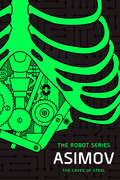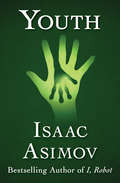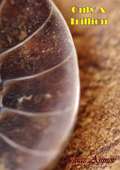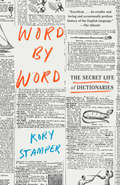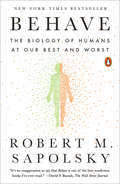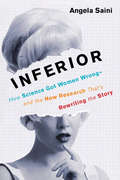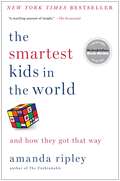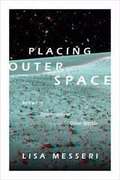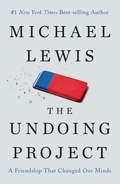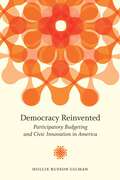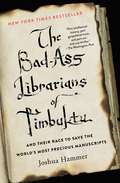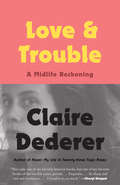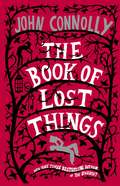Special Collections
Ted.com Recommended Reads
- Table View
- List View
Caves of Steel
by Isaac AsimovA millennium into the future two advancements have altered the course of human history: the colonization of the galaxy and the creation of the positronic brain. Isaac Asimov's Robot novels chronicle the unlikely partnership between a New York City detective and a humanoid robot who must learn to work together. Like most people left behind on an over-populated Earth, New York City police detective Elijah Baley had little love for either the arrogant Spacers or their robotic companions. But when a prominent Spacer is murdered under mysterious circumstances, Baley is ordered to the Outer Worlds to help track down the killer. The relationship between Life and his Spacer superiors, who distrusted all Earthmen, was strained from the start. Then he learned that they had assigned him a partner: R. Daneel Olivaw. Worst of all was that the "R" stood for robot--and his positronic partner was made in the image and likeness of the murder victim!
Youth
by Isaac AsimovTwo young boys find some very unusual new pets in this short story from a Grand Master of Science Fiction. Tagging along while his astronomer father visits an industrialist at his vast estate, young Slim is lucky enough to make fast friends with the industrialist&’s son, Red, who has recently caught some very strange animals on the property. The animals seem intelligent enough, and Red recruits Slim to help him train the odd creatures to do circus tricks. But the boys are about to discover their playthings aren&’t exactly animals—and they&’ve allowed themselves to be caught for a reason . . . Youth is a riveting tale from the author of countless classics, including I, Robot and the Foundation Trilogy, which won the Hugo Award for Best All-Time Series. This ebook has been professionally proofread to ensure accuracy and readability on all devices.
Only A Trillion
by Isaac AsimovA trillion seconds is equal to 31,700 years.A trillion inches is equal to 15,800,000 miles.In other words, a trillion seconds ago, Stone Age man lived in caves, and mastodons roamed Europe and North America.Or, a trillion-inch journey will carry you 600 times around the Earth, and leave more than enough distance to carry you to the moon and back.And yet a good part of the chapters that follow ought to show you quite plainly that even a trillion can become a laughably small figure in the proper circumstances.Isaac Asimov is curious about nearly everything, and he has made it his business to share whatever he learns with us--there are few people as good at it as he is.ONLY A TRILLION is only one example of the range of his talents and the depth of his knowledge. These twelve essays are on such diverse subjects as life on other planets, the famous Thiotimoline--and The Goose That Laid The Golden Eggs...but you're just going to have to buy this book to find out what he knows about that.
Word by Word
by Kory StamperDo you have strong feelings about the word “irregardless”? Have you ever tried to define the word “is”? Brimming with intelligence and personality, this vastly entertaining account of how dictionaries are made is a must-read for word mavens. Many of us take dictionaries for granted, and few may realize that the process of writing dictionaries is, in fact, as lively and dynamic as language itself. With sharp wit and irreverence, Kory Stamper cracks open the complex, obsessive world of lexicography, from the agonizing decisions about what to define and how to do it, to the knotty questions of usage in an ever-changing language. She explains why small words are the most difficult to define, how it can take nine months to define a single word, and how our biases about language and pronunciation can have tremendous social influence. And along the way, she reveals little-known surprises—for example, the fact that “OMG” was first used in a letter to Winston Churchill in 1917. Word by Word brings to life the hallowed halls (and highly idiosyncratic cubicles) of Merriam-Webster, a startlingly rich world inhabited by quirky and erudite individuals who quietly shape the way we communicate. Certain to be a delight for all lovers of words, Stamper’s debut will make you laugh as much as it makes you appreciate the wonderful complexities and eccentricities of the English language.
Behave
by Robert M. SapolskyWhy do we do the things we do?Over a decade in the making, this game-changing book is Robert Sapolsky's genre-shattering attempt to answer that question as fully as perhaps only he could, looking at it from every angle. Sapolsky's storytelling concept is delightful but it also has a powerful intrinsic logic: he starts by looking at the factors that bear on a person's reaction in the precise moment a behavior occurs, and then hops back in time from there, in stages, ultimately ending up at the deep history of our species and its genetic inheritance.And so the first category of explanation is the neurobiological one. What goes on in a person's brain a second before the behavior happens? Then he pulls out to a slightly larger field of vision, a little earlier in time: What sight, sound, or smell triggers the nervous system to produce that behavior? And then, what hormones act hours to days earlier to change how responsive that individual is to the stimuli which trigger the nervous system? By now, he has increased our field of vision so that we are thinking about neurobiology and the sensory world of our environment and endocrinology in trying to explain what happened.Sapolsky keeps going--next to what features of the environment affected that person's brain, and then back to the childhood of the individual, and then to their genetic makeup. Finally, he expands the view to encompass factors larger than that one individual. How culture has shaped that individual's group, what ecological factors helped shape that culture, and on and on, back to evolutionary factors thousands and even millions of years old.The result is one of the most dazzling tours de horizon of the science of human behavior ever attempted, a majestic synthesis that harvests cutting-edge research across a range of disciplines to provide a subtle and nuanced perspective on why we ultimately do the things we do...for good and for ill. Sapolsky builds on this understanding to wrestle with some of our deepest and thorniest questions relating to tribalism and xenophobia, hierarchy and competition, morality and free will, and war and peace. Wise, humane, often very funny, Behave is a towering achievement, powerfully humanizing, and downright heroic in its own right.
Inferior
by Angela SainiWhat science has gotten so shamefully wrong about women, and the fight, by both female and male scientists, to rewrite what we thought we knewFor hundreds of years it was common sense: women were the inferior sex. Their bodies were weaker, their minds feebler, their role subservient. No less a scientist than Charles Darwin asserted that women were at a lower stage of evolution, and for decades, scientists—most of them male, of course—claimed to find evidence to support this.Whether looking at intelligence or emotion, cognition or behavior, science has continued to tell us that men and women are fundamentally different. Biologists claim that women are better suited to raising families or are, more gently, uniquely empathetic. Men, on the other hand, continue to be described as excelling at tasks that require logic, spatial reasoning, and motor skills. But a huge wave of research is now revealing an alternative version of what we thought we knew. The new woman revealed by this scientific data is as strong, strategic, and smart as anyone else.In Inferior, acclaimed science writer Angela Saini weaves together a fascinating—and sorely necessary—new science of women. As Saini takes readers on a journey to uncover science’s failure to understand women, she finds that we’re still living with the legacy of an establishment that’s just beginning to recover from centuries of entrenched exclusion and prejudice. Sexist assumptions are stubbornly persistent: even in recent years, researchers have insisted that women are choosy and monogamous while men are naturally promiscuous, or that the way men’s and women’s brains are wired confirms long-discredited gender stereotypes.As Saini reveals, however, groundbreaking research is finally rediscovering women’s bodies and minds. Inferior investigates the gender wars in biology, psychology, and anthropology, and delves into cutting-edge scientific studies to uncover a fascinating new portrait of women’s brains, bodies, and role in human evolution.
The Smartest Kids in the World
by Amanda RipleyHow do other countries create &“smarter&” kids? What is it like to be a child in the world&’s new education superpowers? The Smartest Kids in the World &“gets well beneath the glossy surfaces of these foreign cultures and manages to make our own culture look newly strange....The question is whether the startling perspective provided by this masterly book can also generate the will to make changes&” (The New York Times Book Review).In a handful of nations, virtually all children are learning to make complex arguments and solve problems they’ve never seen before. They are learning to think, in other words, and to thrive in the modern economy. Inspired to find answers for our own children, author and Time magazine journalist Amanda Ripley follows three Americans embedded in these countries for one year. Kim, fifteen, raises $10,000 so she can move from Oklahoma to Finland; Eric, eighteen, trades his high-achieving Minnesota suburb for a booming city in South Korea; and Tom, seventeen, leaves a historic Pennsylvania village for Poland. Through these young informants, Ripley meets battle-scarred reformers, sleep-deprived zombie students, and a teacher who earns $4 million a year. Their stories, along with groundbreaking research into learning in other cultures, reveal a pattern of startling transformation: none of these countries had many “smart” kids a few decades ago. Things had changed. Teaching had become more rigorous; parents had focused on things that mattered; and children had bought into the promise of education.
Placing Outer Space
by Lisa MesseriIn Placing Outer Space Lisa Messeri traces how the place-making practices of planetary scientists transform the void of space into a cosmos filled with worlds that can be known and explored. Making planets into places is central to the daily practices and professional identities of the astronomers, geologists, and computer scientists Messeri studies. She takes readers to the Mars Desert Research Station and a NASA research center to discuss ways scientists experience and map Mars. At a Chilean observatory and in MIT's labs she describes how they discover exoplanets and envision what it would be like to inhabit them. Today's planetary science reveals the universe as densely inhabited by evocative worlds, which in turn tells us more about Earth, ourselves, and our place in the universe.
The Undoing Project
by Michael LewisHow a Nobel Prize-winning theory of the mind altered our perception of reality.
Forty years ago, Israeli psychologists Daniel Kahneman and Amos Tversky wrote a series of breathtakingly original studies undoing our assumptions about the decision-making process. Their papers showed the ways in which the human mind erred, systematically, when forced to make judgments in uncertain situations. Their work created the field of behavioral economics, revolutionized Big Data studies, advanced evidence-based medicine, led to a new approach to government regulation, and made much of Michael Lewis's own work possible. Kahneman and Tversky are more responsible than anybody for the powerful trend to mistrust human intuition and defer to algorithms.
The Undoing Project is about a compelling collaboration between two men who have the dimensions of great literary figures. They became heroes in the university and on the battlefield--both had important careers in the Israeli military--and their research was deeply linked to their extraordinary life experiences. Amos Tversky was a brilliant, self-confident warrior and extrovert, the center of rapt attention in any room; Kahneman, a fugitive from the Nazis in his childhood, was an introvert whose questing self-doubt was the seedbed of his ideas. They became one of the greatest partnerships in the history of science, working together so closely that they couldn't remember whose brain originated which ideas, or who should claim credit. They flipped a coin to decide the lead authorship on the first paper they wrote, and simply alternated thereafter.
This story about the workings of the human mind is explored through the personalities of two fascinating individuals so fundamentally different from each other that they seem unlikely friends or colleagues. In the process they may well have changed, for good, mankind's view of its own mind.
A New York Times Bestseller
Democracy Reinvented
by Hollie Russon GilmanParticipatory Budgeting—the experiment in democracy that could redefine how public budgets are decided in the United States. Democracy Reinvented is the first comprehensive academic treatment of participatory budgeting in the United States, situating it within a broader trend of civic technology and innovation. This global phenomenon, which has been called "revolutionary civics in action" by the New York Times, started in Brazil in 1989 but came to America only in 2009. Participatory budgeting empowers citizens to identify community needs, work withelected officials to craft budget proposals, and vote on how to spend public funds. Democracy Reinvented places participatory budgeting within the larger discussion of the health of U. S. democracy and focuses on the enabling political and institutional conditions. Author and former White House policy adviser Hollie Russon Gilman presents theoretical insights, indepth case studies, and interviews to offer a compelling alternative to the current citizen disaffection and mistrust of government. She offers policyrecommendations on how to tap online tools and other technological and civic innovations to promote more inclusive governance. While most literature tends to focus on institutional changes without solutions, this book suggests practical ways to empower citizens to become change agents. Reinvesting in Democracy also includes a discussion on the challenges and opportunities that come with using digital tools to re-engage citizens in governance.
The Bad-Ass Librarians of Timbuktu
by Joshua Hammer**New York Times Book Review Editors' Choice** To save ancient Arabic texts from Al Qaeda, a band of librarians pulls off a brazen heist worthy of Ocean&’s Eleven in this &“fast-paced narrative that is…part intellectual history, part geopolitical tract, and part out-and-out thriller&” (The Washington Post) from the author of The Falcon Thief.In the 1980s, a young adventurer and collector for a government library, Abdel Kader Haidara, journeyed across the Sahara Desert and along the Niger River, tracking down and salvaging tens of thousands of ancient Islamic and secular manuscripts that were crumbling in the trunks of desert shepherds. His goal: preserve this crucial part of the world&’s patrimony in a gorgeous library. But then Al Qaeda showed up at the door. &“Part history, part scholarly adventure story, and part journalist survey…Joshua Hammer writes with verve and expertise&” (The New York Times Book Review) about how Haidara, a mild-mannered archivist from the legendary city of Timbuktu, became one of the world&’s greatest smugglers by saving the texts from sure destruction. With bravery and patience, Haidara organized a dangerous operation to sneak all 350,000 volumes out of the city to the safety of southern Mali. His heroic heist &“has all the elements of a classic adventure novel&” (The Seattle Times), and is a reminder that ordinary citizens often do the most to protect the beauty of their culture. His the story is one of a man who, through extreme circumstances, discovered his higher calling and was changed forever by it.
Love and Trouble
by Claire DedererFrom the New York Times best-selling author of Poser: My Life in Twenty-Three Yoga Poses, a ferocious, sexy, hilarious memoir about going off the rails at midlife and trying to reconcile the girl she was with the woman she has become. Claire Dederer is a happily married mother of two, ages nine and twelve, when she suddenly finds herself totally despondent and, simultaneously, suffering through a kind of erotic reawakening. This exuberant memoir shifts between her present experience as a middle-aged mom in the grip of mysterious new hungers and herself as a teenager--when she last experienced life with such heightened sensitivity and longing. From her hilarious chapter titles ("How to Have Sex with Your Husband of Seventeen Years") to her subjects--from the boyfriend she dumped at fourteen the moment she learned how to give herself an orgasm, to the girls who ruled her elite private school ("when I left Oberlin I thought I had done with them forever, but it turned out ...they also edited all the newspapers and magazines, and wrote all the books"), to raising a teenage daughter herself--Dederer writes with an electrifying blend of wry wit and raw honesty. She exposes herself utterly, and in doing so captures something universal about the experience of being a woman, a daughter, a wife.From the Hardcover edition.
The Book of Lost Things
by John ConnollyNew York Times bestselling author John Connolly's unique imagination takes readers through the end of innocence into adulthood and beyond in this dark and triumphantly creative novel of grief and loss, loyalty and love, and the redemptive power of stories.High in his attic bedroom, twelve-year-old David mourns the death of his mother, with only the books on his shelf for company. But those books have begun to whisper to him in the darkness. Angry and alone, he takes refuge in his imagination and soon finds that reality and fantasy have begun to meld. While his family falls apart around him, David is violently propelled into a world that is a strange reflection of his own—populated by heroes and monsters and ruled by a faded king who keeps his secrets in a mysterious book, The Book of Lost Things. Taking readers on a vivid journey through the loss of innocence into adulthood and beyond, New York Times bestselling author John Connolly tells a dark and compelling tale that reminds us of the enduring power of stories in our lives.
